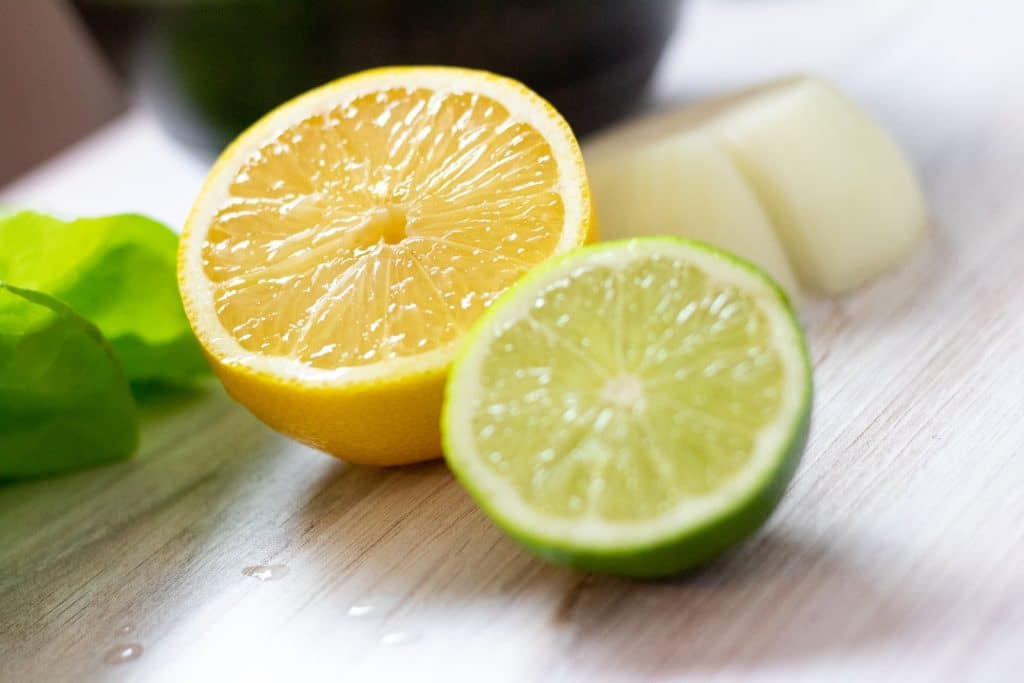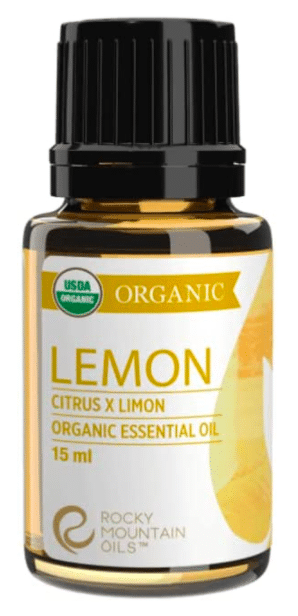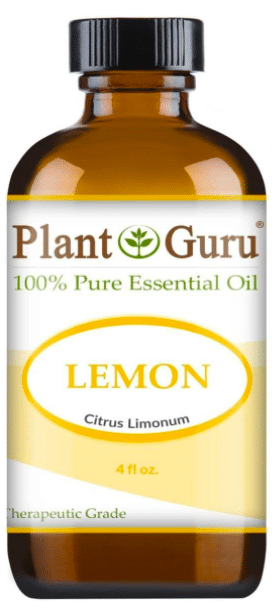Lemon essential oil conjures up visions of summertime and fresh, sunny days that are not too far away as we approach the first day of Spring! While lemon is great for margaritas and lemonade, the essential oil it produces is jam-packed with benefits.
Consider this your all-inclusive guide to all things lemon essential oil! We’ll start by discussing what components of lemon essential oil make it so powerful, then share some of the benefits and uses for lemon essential oil. We’ll finish by sharing a few top-rated lemon essential oil brands that you can try out at home as well as how to make your lemon oil. Additionally, we will answer some common questions about this essential oil.
This sour fruit has some sweet benefits for our health, read on to find out everything that lemon essential oil can do for you!
Table of Contents
About Lemon Essential Oil
It turns out a lemon might not even be its species of fruit! While some scientists acknowledge lemons to be their own species, some more recent studies argue that lemons are just a hybrid. As its own species, it is considered Citrus limon, but it may also be a hybrid of pomelo, citron, and mandarin citrus fruits.

The precise origin of the lemon is unknown, but some botanists believe that it came from Kashmir (northern India), while others believe it originated in Southeast Asia. Lastly, some still consider it to be from Iran or even Italy.
Lemons & Scurvy
Researchers know that the first place that the lemon trees showed up in the United States was Florida after the expeditions of Christopher Columbus to the New World. Lemons were likely used by explorers to prevent scurvy because of their high Vitamin C and antioxidant content.
Lemon, as we know it today, has a wide range of uses that are not just limited to cooking or cleaning that we will get into below.
Chemical Composition
Some of the most significant chemical compounds of lemon essential oil that provide its effective uses are a-pinene, camphene, b-pinene, sabinene, myrcene, a-terpinene, linalool, b-bisabolene, limonene, trans-a-bergamotene, nerol, and neral. For those of us who don’t speak chemistry, we’ll lay out what some of these chemicals are and what they do for us.
A-Pinene
A-pinene in different plants and fruits has a rich history of usage dating back to the times of ancient aboriginals who used a-pinene-filled resins to treat open wounds. A-pinene is considered a “terpene.” This chemical compound has a slightly woody scent and has several proven benefits congruent with the benefits we see from lemon essential oil. A-pinene has been shown to kill Pancreatic cancer cells in mice, kill bacteria like Staph and Strep, boost memory in dementia patients in conjunction with other chemicals, and more. Needless to say, alpha-pinene is a massive contributor to lemon essential oil’s power.
Limonene
Limonene is a chemical compound that is a lot of citrus fruits. You can even impress your friends with your chemistry knowledge by sharing that limonene is a cyclic monoterpene that is used in fragrance and food flavoring! Not only does this chemical compound smell pleasant, but it also has proven antimicrobial activity.
In one study, limonene reduced the growth of bacteria and fungus in a petri dish, which is a promising indicator that this chemical compound can have this effect in humans as well. The chemical compounds in lemon are anti-microbial, which is why lemon essential oil is commonly used as part of a disinfectant.
Beta-Pinene
Like alpha-pinene, beta-pinene is a monoterpene, which is just an organic compound that occurs in plants like limes. You may have heard the word “terpene” before when referencing cannabis. The reason is that the terpenoid compounds in cannabis are similar to those in essential oils – they’re both plants after all! Terpenes not only give cannabis (and all essential oils) their unique scents, they also produce medicinal effects.
Lime Versus Lemon
Lime is no different. The monoterpene beta-pinene gives lime its woodsy type scent and also is part of what makes it into a bacteria killer! In one study, beta-pinene was shown to have an inhibitory effect on the growth of bacteria when tested against a popular antibacterial drug.

All of the chemical compounds inside lemon essential oil offer benefits, but these are some of the most significant compounds found inside of this fantastic citrus oil.
Lemon Essential Oil Benefits
May Help Reduce Nausea
Lemon essential oil used in aromatherapy is generally considered to be a great way to relieve nausea, heartburn, indigestion, and upset stomach symptoms.
Lemon essential oil’s anti-nausea powers were put to the test with a group of women experiencing morning sickness in a 2014 study.
The findings indicated that a higher percentage of women who were instructed to inhale lemon essential oil experienced reduced nausea symptoms in comparison with the women who inhaled the placebo. While the percentage improvement is only statistically significant, further testing is needed to prove that lemon essential oil is truly effective against nausea and morning sickness.
How to Use
Give lemon essential oil a try the next time you are feeling nauseous by diffusing a few drops or smelling it directly out of the bottle.
May Reduce Stress
Lemon essential oil can remind people of bright and cheery things like warm weather. Something that others might not know is that taking a whiff of lemon essential oil may also reduce physiological signs of stress!

One study compared lavender essential oil, lemon essential oil, and water as scents that could potentially reduce stress. Participants in each group were asked to smell lavender oil, lemon oil, or water. Then various vital signs were measured to determine quantitatively whether these oils had the potential to reduce stress.
The findings indicated that the lemon essential oil group reported a more positive mood and showed other signs of reduced stress.
How to Use
Try diffusing a few drops of lavender and a few drops of lemon essential oil in your workplace and observe how these oils affect your mood throughout the day!
May Treat Skin Conditions
Because of those fantastic terpenes that we touched on above, lemon essential oil is blessed with antimicrobial properties!
Although lemon essential oil has not been highly researched as a solution for acne, a relatively recent study tested its efficacy against various skin infections.

Lemon essential oil has shown promising evidence as a fighter against staph infections. Nevertheless, the study notes that further research is necessary to prove lemon essential oil’s efficacy.
How to Use
If you’d like to try out lemon essential oil for a skin condition, try diluting it with a carrier oil, perform a small patch to test for any skin sensitivity, then apply it to the affected area.
Please make sure to apply sunscreen after application if you do this during the day as lemon is phototoxic.
May Improve Respiratory Function

Although several sources say that lemon essential oil improves respiratory function, there is little research cited that supports these claims.
The most relevant research study about lemon essential oil and respiratory function features a nasal spray that uses lemon essential oil as an active ingredient. Using this spray in the study was helpful for those with allergic sinusitis and thereby improved respiration, but saying it improves respiratory function overall or directly has yet to be proven.
How to Use
Most people don’t have adverse reactions to lemon oil, so give this a try the next time you are feeling congested. Boil some water on the stove, then remove the pot from heat and add a few drops of lemon essential oil to the bowl. You can hold your face over the steam and feel the relief of the steam and the lemon essential oil!
May Boost Immune System Function
Lemon essential oil is said to additionally support the function of the lymphatic system, which is a massive component of our immune systems. The lymphatic system helps drain out all of the toxins that accumulate in our bodies, so keeping this part of our bodies in tip-top shape is very important.
Again, the direct effect of lemon essential oil on the lymphatic system is not supported by detailed scientific research, but the observed effects are still there. Based on scientific research, we know that lemon essential oil contains antibacterial terpenoids that aid in boosting the immune system.
May Help Keep Hair Healthy
Lemon essential oil may be able to keep your hair healthy! This claim is another piece of observed evidence regarding lemon essential oil, but it still might work for you.

Allegedly this essential oil can help reduce buildup at the scalp and reduce sebum production, but the scientific studies to back this up are just not there yet.
How to Use
Try it out for yourself by adding a few drops to a carrier oil and massaging it into your scalp.
Keep in mind that lemon tends to lighten the hair. Also, keep in mind that your scalp may burn if you don’t have it thoroughly rinsed out before you venture outdoors.
Lemon Essential Oil for Energy
We mentioned above how lemon essential oil is a mood booster. In addition to boosting energy, lemon is generally considered to uplift the spirit as well. It has a variety of uses externally, and even around your home!
How to Use
Diffusing lemon essential oil in your space is a good option for increasing energy and a positive mood! Add a few drops to your diffuser and enjoy the benefits!
Unique Uses for Lemon Essential Oil
Lemon essential oil is the jack of all trades! Here are a few different recipes and applications of lemon essential oil that you will be dying to try out!
Skin Brightening Body Scrub
We already know that lemon essential oil can be great for skin conditions, so when you combine that power with detoxifying Epsom salts, you have a luxurious treat for your body!
This recipe features our DIY lemon oil recipe( listed below) in addition to a few drops of lemon essential oil.
- Take 1/3 cup of our lemon oil recipe, combine it with 2/3 cup of Epsom salts
- Mix in a few drops of lemon essential oil
- Voilà! A body scrub that you can use to brighten your skin or share with a friend!
Oily Hair Tonic
We touched on the observed benefits of lemon essential oil for oily hair, so here’s a recipe to try it out for yourself! Take 40 drops of lemon essential oil, 1/2 cup of witch hazel, and 1/2 cup of water and combine it into a spray bottle, then shake to blend all of the ingredients. Here’s what to do from there:
- In the shower, wash your hair normally.
- After showering and while hair is still damp, apply the tonic to the roots of your hair. Make sure to rub the solution into the scalp with your fingertips.
- Allow hair to air dry and experience clarified roots!
Lemon Oil Surface Cleaner
We’ve mentioned that lemon oil can kick bacteria’s butt, so why not put this to use on your home surfaces?
- Combine 20 drops of lemon essential oil with two tablespoons of liquid soap and two and a half cups of water,
- Combine in a dark-colored spray bottle to prevent decomposition. Then use the solution at your leisure to clean surfaces and kill bacteria naturally.
Our Top Picks for Lemon Essential Oil
If you’re going to ingest lemon essential oil, you want to make sure that you are using top-notch stuff. If you’re planning on using this oil topically or diffusing it, you want to make sure that what you’re putting into and onto your body is as pure as possible. Here are a few lemon essential oils from reputable brands that can meet your needs and your budget.
Rocky Mountain Oils
Rocky Mountain Oils has an excellent reputation for selling quality essential oils, and there are multiple reasons as to why. Every bottle includes access to test results for the particular batch that you receive to hold the company accountable for quality assurance.

You can purchase this oil and confidently know that you will not be getting any funky stuff in your bottle. Prices are slightly higher than other brands, this oil is a higher-end iteration of lemon essential oil.
The Plant Guru
The Plant Guru is known for making high-quality oils at low prices. They offer an organic version of lemon essential oil as well.

You may not be able to look up the specific GC/MS results of your bottle of essential oil. Although, the company does offer a general finding from a third-party lab for most of their oils.
Lastly, this company is highly recommended if you are planning on adding lemon essential oil to a DIY cleaning solution.
How to Make Lemon Oil at Home:
Several recipes can be found online for making lemon oil at home, but this one is a personal favorite. Give this one a try and drop us a comment below to let us know how it went for you!
- Take five fully ripe organic lemons and wash them under cold water, then pat them dry.
- Use a vegetable peeler or zester to remove the yellow skin of the lemons, taking care not to include any pulp or the bitter white pith of the lemon.
- Prepare a double boiler
- Place the lemon peels on the top boiler and cover them with 1 cup of your oil of choice. We recommend coconut oil, sweet almond oil, or olive oil.
- Reduce the heat and let the lemon peels infuse with the oil for about 3 hours.
- Strain the oil into mason jars and squeeze the peels as you strain to ensure that you are getting out all of the oil.
- Store this oil in a cool, dark place and use within six months.
Common Questions About Lemon Essential Oil
Can lemon essential oil help with depression?
Depression can be a serious psychiatric disorder and requires the attention of trained medical professionals. Lemon essential oil is not a replacement for psychiatric medication or talk therapy. However, if you are feeling a bit down or need a little mood boost, diffusing lemon essential oil is an excellent option for you.
How is lemongrass essential oil different from lemon essential oil?
These essential oils come from two different plants. Some similarities include: both lemon and lemongrass contain citral and limonene. They may also treat similar ailments like acne and oily skin and blend similarly with other essential oils.

